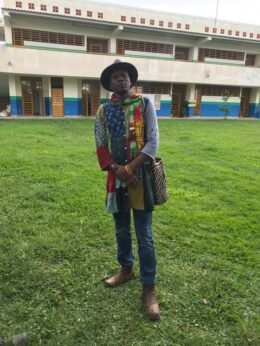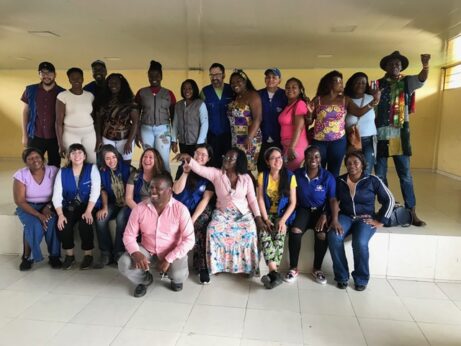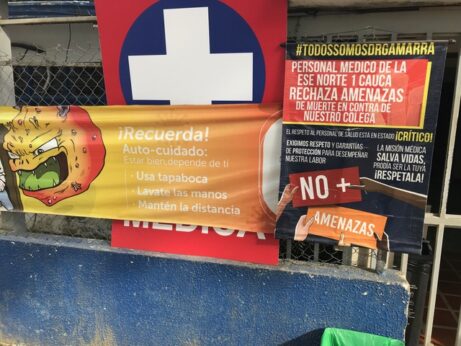
This is the second in a three-part series by People’s World reporter Eric Gordon, who recently returned from Colombia after touring with a Witness for Peace delegation. Part 1 can be read here.
BUENOS AIRES, Colombia — As stipulated in the 1991 Constitution, which for the first time recognized Afro-Colombians and Indigenous peoples as Colombian citizens, territorial communities have arisen for mutual self-interest and defense, or in many cases have reasserted their historical presence and authority on traditional lands.
Buenos Aires is a small rural community in the north of Cauca, and our Witness for Peace delegation attended a “consejo,” a regional conclave of Afro-Colombian leaders in the area, many of them resident on the territorio where we met. More than 40 such leaders, representing women’s and youth groups, victims of violence, church elders, the Maroon Guards, the onsite school, a musical ensemble, disability groups and community councils, gathered to receive us for an informative session on the current state of affairs.
For those on the delegation who had met with this consejo a year ago, it was an opportunity to receive an update on conditions, which, to some, had seemed to deteriorate, with even fewer federal funds and less physical protection for endangered leaders.
Héctor Marino Carabalí Charrupi acknowledged the change of government in Bogotá since the last WfP visit, but said the

repression of his community persists, with armed groups in the area constantly challenging human rights and lives in the territorio. He thanked us for our presence: “We don’t have access to those responsible, but you do—to your representatives, senators and candidates. We now have an opportunity, but the attorney general is standing in the way of peace and reconciliation.”
One by one, each person attending the consejo introduced themselves, many thanking God for bringing us together. Once again here, as in the rural campesino group we had met earlier in our trip, people spoke fluently, passionately, confidently. Several themes kept recurring: The lack of promised support from the government, the widespread sense of fear, the failure of the crop substitution policy—which means less food to sustain the community—people leaving the community for opportunities elsewhere only to find they cannot easily adapt to city life. Perhaps it could all be summed up, as one person put it, “The fear of war dominates us. If there’s no peace we’ll have no rights.”
Once again we heard from Héctor, who had been part of the negotiating team in Havana for the Peace Accord and helped write it (a Google search will turn up dozens of articles about him). Héctor is a born leader—and an accomplished orator. Without notes he gave us a backgrounder speech—the word “stemwinder” came to mind—that systematically laid out all of Colombia’s problems, starting with statistics: “Colombia imports 85% of its food. That’s food we should have grown. They kill us not only with bullets, but with hunger and inequality too. The first point of the Peace Accord is rural reform. As soon as the Accord was signed in Havana, the government started ignoring its provisions. Our representatives and senators have all the power to implement the Accord, but they erect barricades instead, and legal trickery. For them it’s easier to continue the war than to secure the peace.”

And with that, lunch was served, a rich sancocho of three meats. Georie, one of our delegates, an African-American from North Carolina, spoke for us all by way of summing up our response to everything we’d heard. He’d also been here on WfP’s last visit, and many in the territorio remembered him. “The situation here has gotten worse since last year. It seems like Black people are always paying the price for the greed of others. No Black community should be going through what you are experiencing now.”
Most of us, I am sure, wondered if Héctor was correct in his judgment—that we had access to those responsible, to our representatives, senators and candidates—and could we really make a difference?
The good feeling of mutuality led to some impromptu dancing, photo-snapping, and arms around each other’s shoulders joviality. With my barely adequate Spanish I managed to get a good laugh out of some of my new friends in Buenos Aires by recalling a piece of advice given to me by a former L.A. City Councilwoman long before the days of photoshopping: “When you’re having your photo taken,” she told me, “always have your hand over someone’s shoulder—so they can’t crop you out of the picture!”

Before we departed, most of us joined Héctor and a couple of the Maroon Guards for a short walk around the town just outside the community’s limits. It was a show of force, of presence, to indicate that even here, where armed groups continue to be active and where killings are not uncommon, we were unafraid. I think we were a little nervous, but as they say, there’s safety in numbers.
Héctor accompanied us down the main street, pointed out the Catholic Church, and showed us the town’s fútbol field, mentioning how historic it was. I wondered what he meant: Had Pelé played here once? Was some world soccer record set here? No. Years ago, at the height of the armed conflict, government helicopters blackened the skies for days at a time, hovering overhead and dropping corpses here, covering the field with death. No one in Buenos Aires will ever forget that sight. We returned to our hotel for the night with that sobering image in mind.
People’s World has an enormous challenge ahead of it—to raise $200,000 from readers and supporters in 2023, including $125,000 during the Fund Drive, which runs from Feb. 1 to May 1.
Please donate to help People’s World reach our $200,000 goal. We appreciate whatever you can donate: $5, $10, $25, $50, $100, or more.











